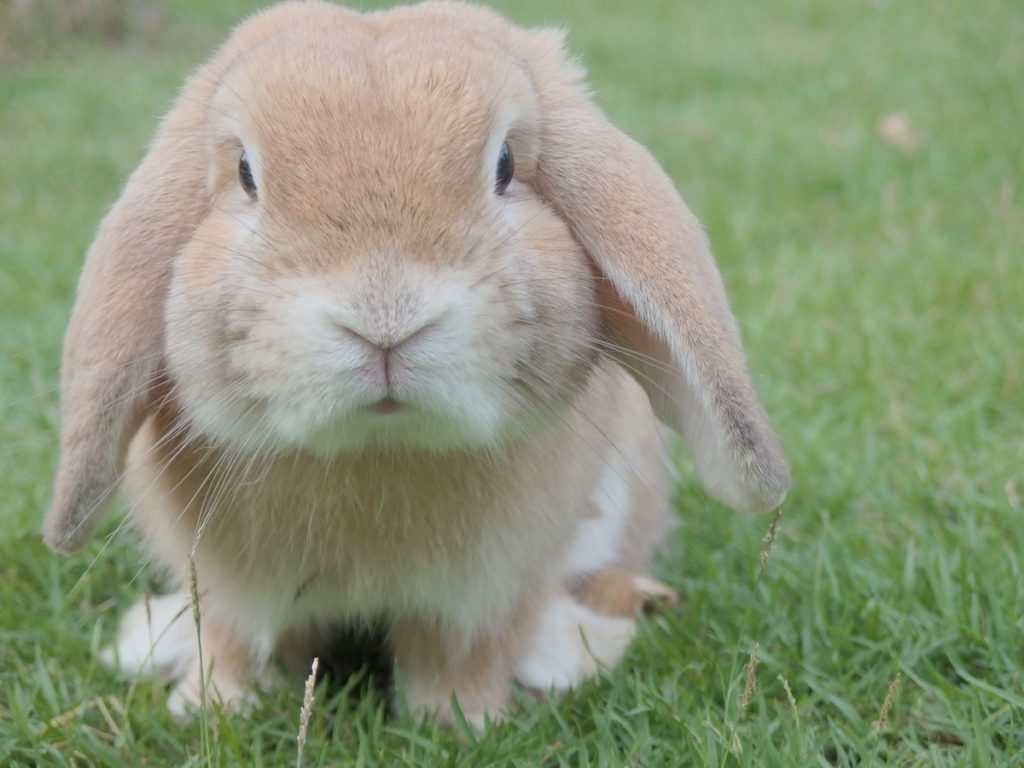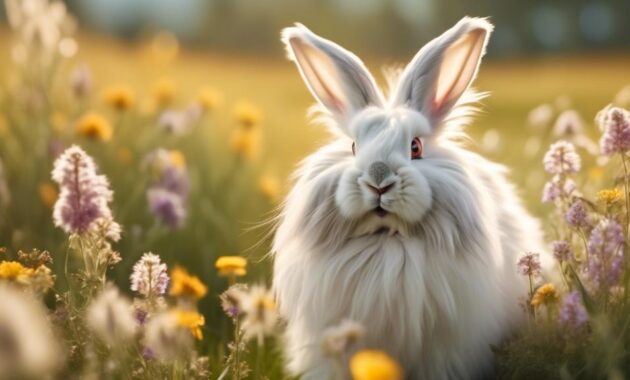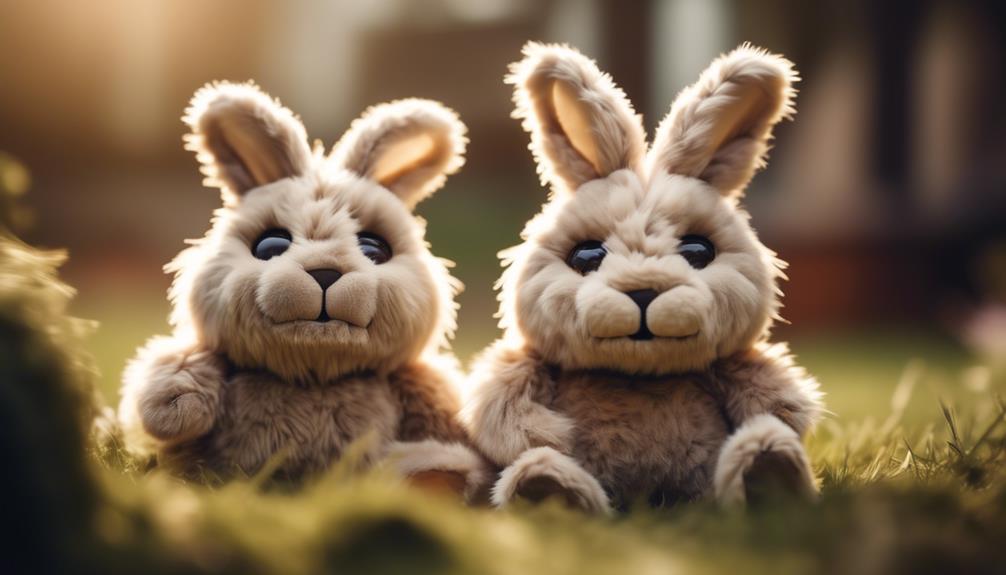
Have you ever dreamed of having a pet that not only looks like a teddy bear, but also has a personality that will melt your heart? Well, get ready to meet the rare Sussex Rabbit breed – the teddy bears with personality.
These fluffy wonders have captivated the hearts of many with their adorable appearance and friendly demeanor. But what makes them so special?
Stay tuned as we unravel the mysteries behind the Sussex Rabbit breed, from their unique characteristics to their compatibility with other pets.
Get ready to be charmed by these lovable creatures!
Key Takeaways
- Sussex rabbits are a medium-sized breed with a compact body shape and a soft, dense coat.
- They were created in the early 1980s through a crossbreeding of Lilac and Californian rabbit breeds.
- Sussex rabbits are known for their gold or cream-colored coat and have been gaining popularity among rabbit enthusiasts.
- They have an affectionate and friendly nature, are easy to train, and can be litter box trained.
Sussex Rabbit Characteristics
The Sussex Rabbit is a medium-sized breed known for its compact body shape, soft and dense coat, and upright ears. With a weight of around 7 pounds and a lifespan of 6-8 years, these rabbits have a charming teddy bear-like appearance.
Their coat, which is usually gold or cream in color, is thick and dense, providing them with extra warmth. Their upright ears not only add to their adorable appearance but also help them to hear and sense their surroundings better.
However, Sussex Rabbits are prone to excess weight gain, so it’s important to monitor their diet and exercise to prevent obesity.
Sussex Rabbit Breed History
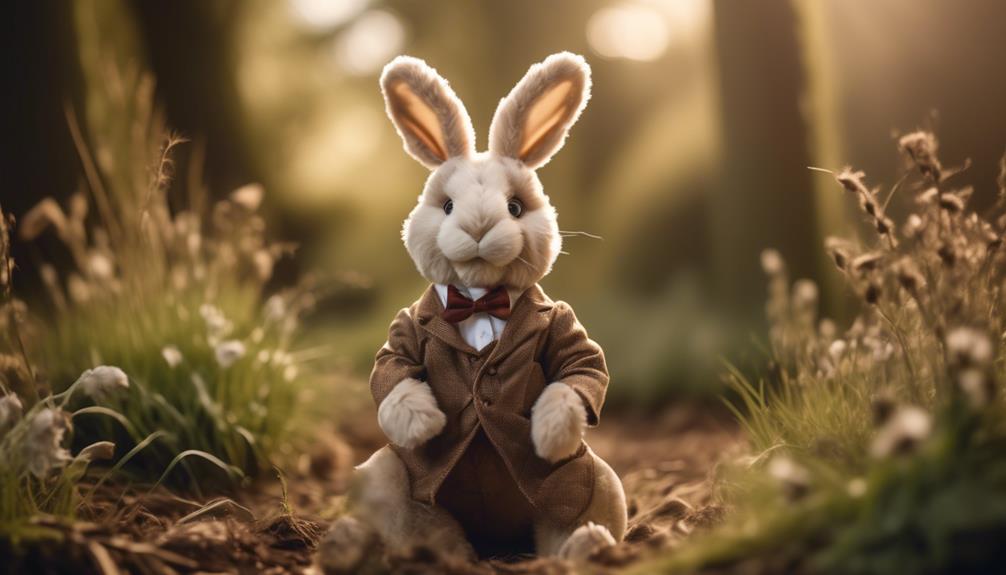
Now let’s explore the fascinating history of the Sussex Rabbit breed, tracing back to its origins and development.
The Sussex Rabbit breed was created in the early 1980s by crossing the Lilac and Californian rabbit breeds. This unique combination resulted in a rabbit with a soft, dense, and thick coat that’s either gold or cream in color.
The Sussex Rabbit is often described as a teddy bear due to its friendly and affectionate personality, as well as its adorable appearance.
While still a rare breed, the Sussex Rabbit is gaining popularity among rabbit enthusiasts. They’re kept as companion animals and also participate in rabbit shows.
If you’re looking for a rabbit with a charming personality and a distinctive coat, the Sussex Rabbit might be the perfect choice for you.
Sussex Rabbit Care Requirements
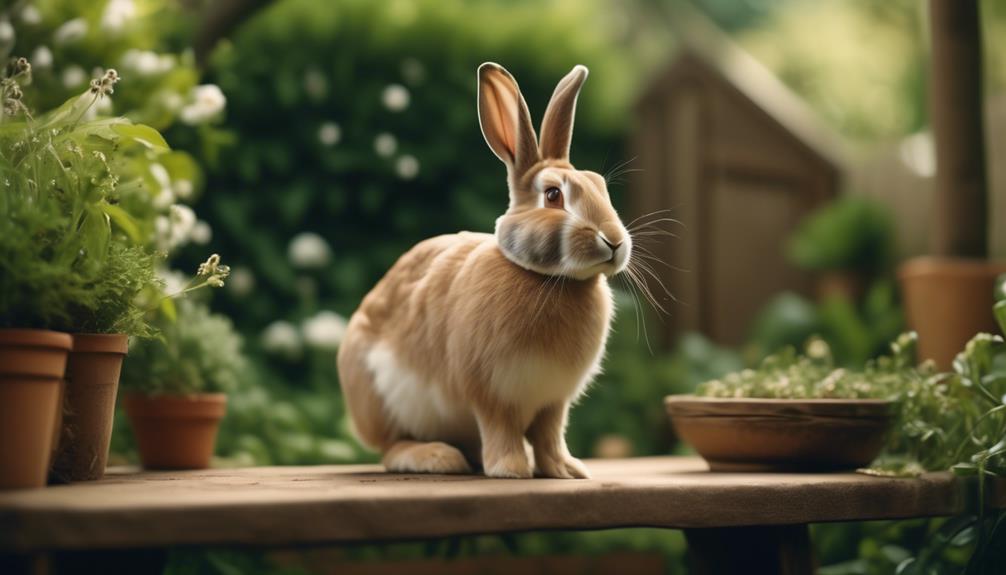
To properly care for a Sussex Rabbit, it’s important to meet their specific needs and provide them with a suitable environment. Here are four key requirements to consider:
- Diet: Ensure a balanced herbivore diet consisting of fresh vegetables, fruits, high-quality hays, and rabbit pellets. This will promote their overall health and prevent weight gain.
- Housing: Whether indoors or outdoors, provide a safe and weatherproof enclosure for your Sussex Rabbit. They should have enough space to hop, stretch, and play.
- Compatibility: Sussex Rabbits are generally compatible with other pets, including dogs and cats. However, always supervise their interactions and introduce them gradually to ensure everyone’s safety.
- Veterinary Care: Regular check-ups and vaccinations against diseases like VHD and Myxomatosis are crucial for maintaining your Sussex Rabbit’s health and well-being.
Sussex Rabbit Health
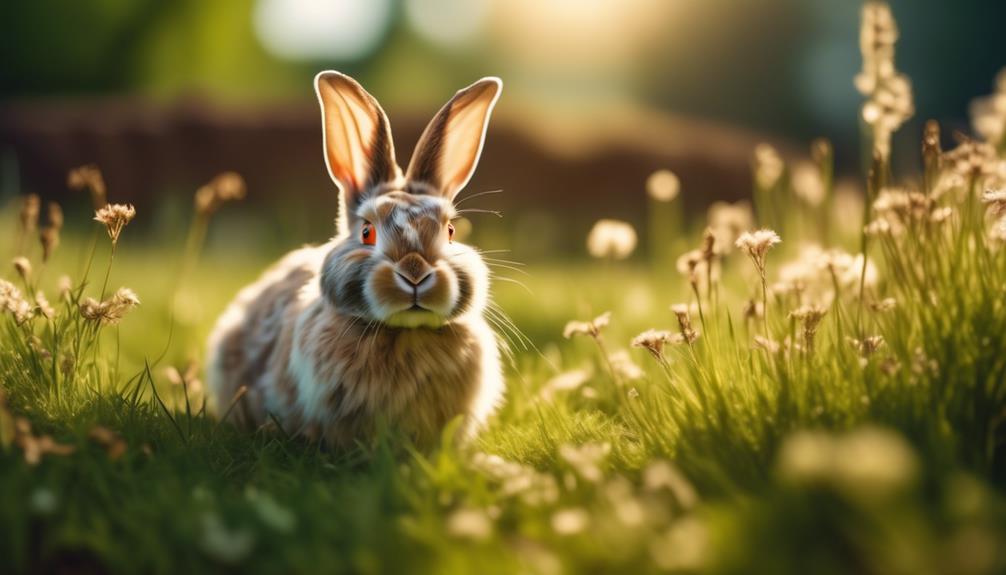
To properly care for your Sussex Rabbit’s well-being, it’s important to understand the factors that contribute to their health.
Sussex Rabbits are prone to weight gain, dental problems, and eye ailments. Regular monitoring of their weight is crucial to prevent obesity, as excess weight can lead to various health issues.
Additionally, dental care is essential for Sussex Rabbits, as they’re susceptible to dental problems such as overgrowth and malocclusion. Regular check-ups with a veterinarian are recommended to ensure your rabbit’s overall health and to address any potential issues early on.
Sussex Rabbit Temperament

What is the temperament of a Sussex Rabbit?
Sussex Rabbits have a delightful temperament that makes them wonderful companions. Here are four key traits that define their personality:
- Affectionate: Sussex Rabbits are known for their loving nature. They enjoy being held, cuddled, and receiving attention from their owners.
- Friendly: These rabbits are social creatures and enjoy the company of humans and other animals. They’re often eager to interact and make friends.
- Inquisitive: Sussex Rabbits are curious by nature and love to explore their surroundings. They enjoy investigating new objects and environments, keeping their owners entertained.
- Playful: With their mischievous and confident nature, Sussex Rabbits love to play. They enjoy hopping around, chasing toys, and engaging in interactive games.
Sussex Rabbit Behavior
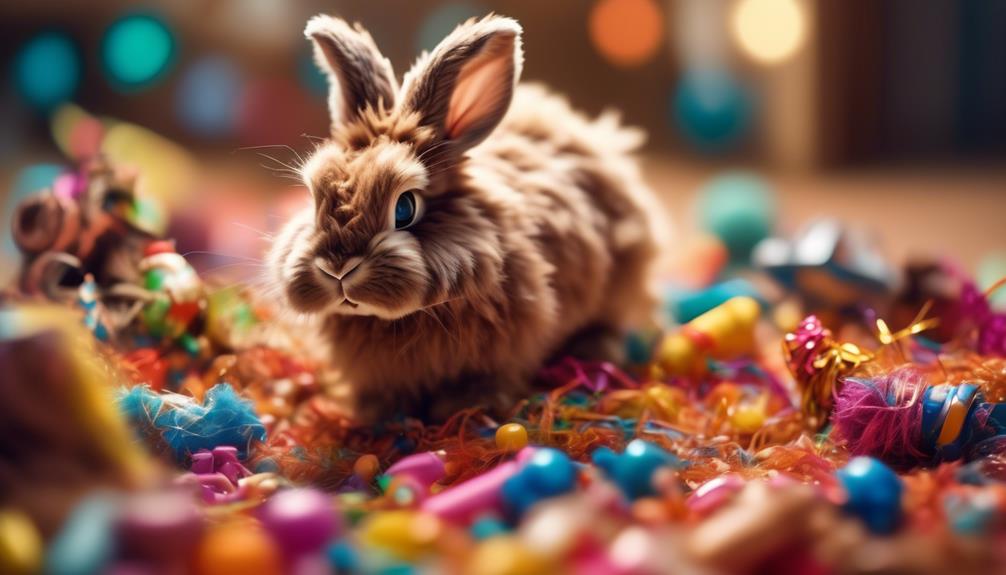
Sussex Rabbit Behavior showcases their lively and playful nature, complementing their affectionate temperament. These rabbits are known for their mischievous and confident behavior, always ready to explore and have fun. They love to hop around, play with toys, and engage in interactive games with their owners.
Sussex rabbits are social animals and enjoy the company of humans and other pets. They’re friendly and inquisitive, always curious about their surroundings. With their easy trainability, Sussex rabbits can be taught tricks and even litter box trained. However, it’s important to provide them with plenty of mental and physical stimulation to prevent boredom.
Sussex Rabbit Diet
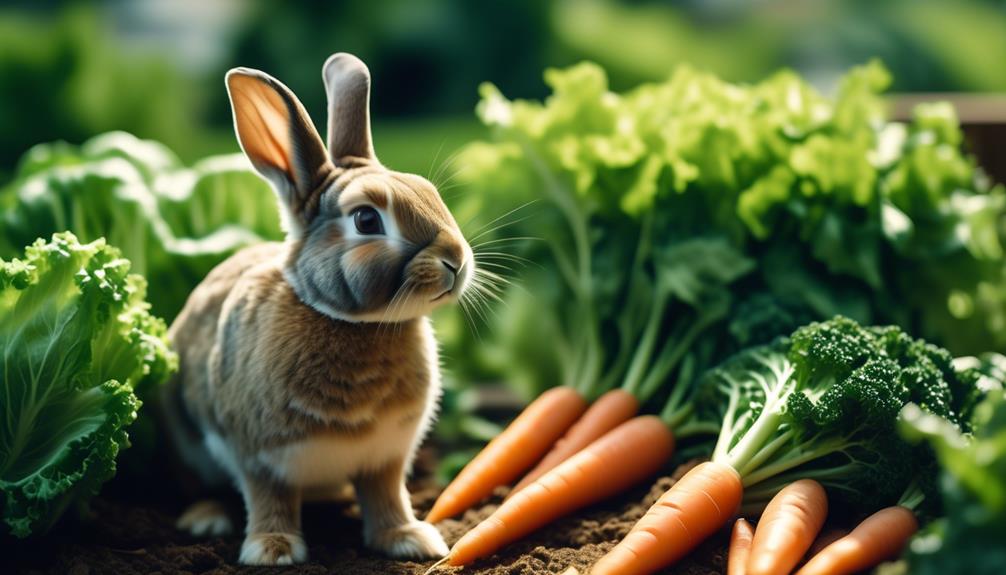
Maintaining a healthy diet is crucial for the overall well-being of a Sussex rabbit. Here are four important points to consider when it comes to the diet of your Sussex rabbit:
- Vegetables: Include a variety of fresh leafy greens such as kale, spinach, and romaine lettuce. Carrots, bell peppers, and broccoli can also be given in moderation.
- Fruits: Treat your Sussex rabbit with small portions of fruits like apples, strawberries, and blueberries. Avoid fruits with high sugar content.
- Rabbit pellets: Provide high-quality rabbit pellets that are specifically formulated for rabbits. These pellets should contain essential nutrients and fiber.
- Hay: Offer unlimited amounts of high-quality hay, such as timothy or orchard grass. Hay helps maintain proper digestion and keeps their teeth in good condition.
Remember to always provide fresh water and monitor their weight to prevent obesity. A well-balanced diet will ensure your Sussex rabbit stays healthy and happy.
Sussex Rabbit Housing
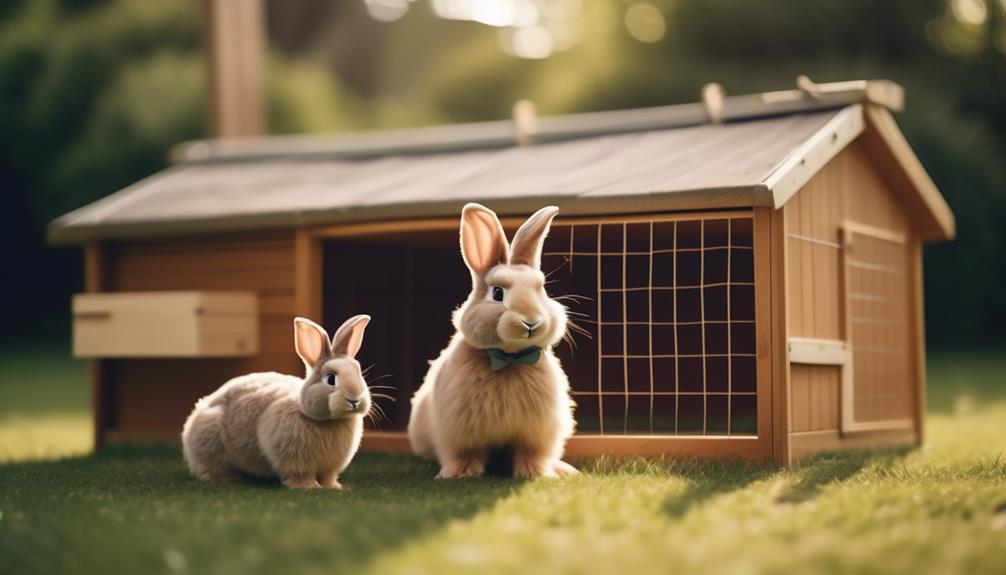
When providing housing for your Sussex rabbit, it’s important to create a safe and comfortable environment for them to thrive in. Whether you choose to keep your rabbit indoors or outdoors, make sure to provide a weatherproof enclosure that offers protection from extreme temperatures and predators.
A spacious hutch or cage with a solid floor is ideal, allowing your rabbit to move around freely. Provide bedding material such as straw or hay for them to burrow and nest in. Additionally, include hiding spots and toys to stimulate their natural instincts and prevent boredom.
Regularly clean the enclosure and replace soiled bedding to maintain a hygienic environment. Remember, a happy and secure housing setup is essential for your Sussex rabbit’s overall well-being.
Sussex Rabbit Compatibility
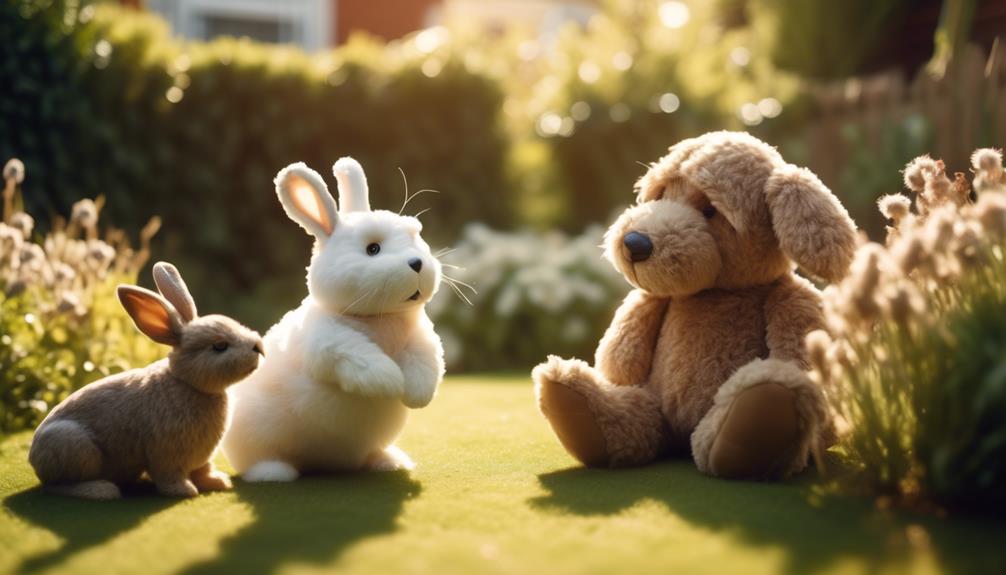
To ensure a harmonious living environment, it’s important to consider the compatibility of your Sussex rabbit with other pets in your home. Here are four factors to keep in mind:
- Temperament: Sussex rabbits are known for their affectionate and friendly nature. They generally get along well with other pets, such as dogs and cats, as long as introductions are done gradually and supervised.
- Size: Sussex rabbits are medium-sized, weighing around 7 pounds. Take into account the size of your other pets when considering their compatibility with a Sussex rabbit. Ensure that your other pets aren’t too big or aggressive, which could potentially harm the rabbit.
- Training: Sussex rabbits are easy to train, including litter box training. This makes them more adaptable to living with other pets, as they can be taught to coexist peacefully and respect boundaries.
- Prey Drive: Consider the prey drive of your other pets, especially if you have dogs or cats. Some animals may have a high prey drive and see the rabbit as potential prey. It’s important to assess the behavior and instincts of your other pets before introducing a Sussex rabbit into your home.
Sussex Rabbit Veterinary Care
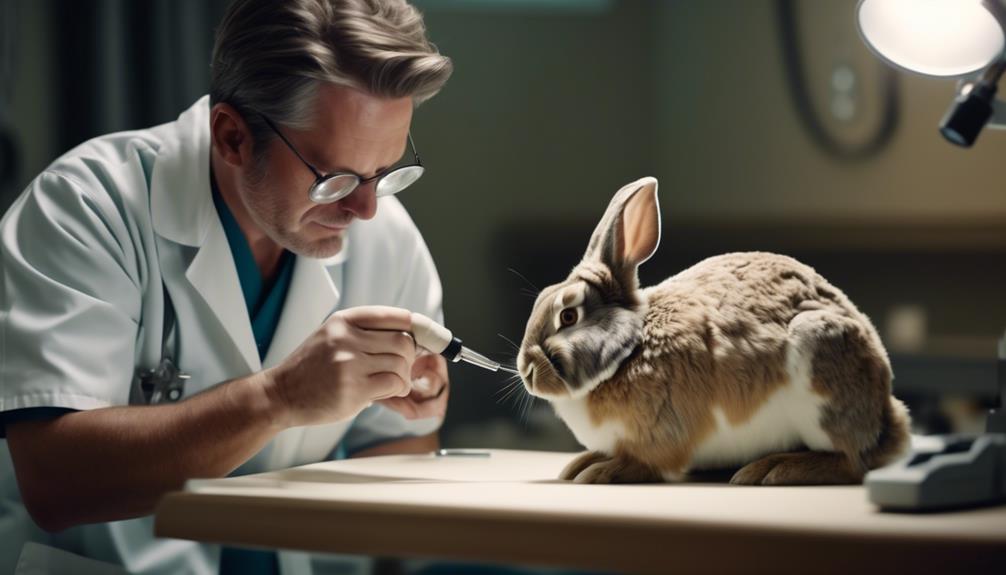
Regular veterinary care is essential for the health and well-being of your Sussex rabbit. Just like any other pet, Sussex rabbits require routine check-ups to ensure they’re in good health.
During these visits, the veterinarian will examine your rabbit, assess its weight, and check for any signs of dental problems or eye ailments. Sussex rabbits are prone to weight gain, so monitoring their weight and providing a balanced diet is crucial. Dental care is also important to prevent any dental issues that can arise from their compact body shape.
Additionally, vaccinations against diseases such as VHD and Myxomatosis should be given to protect your rabbit’s health.
Sussex Rabbit Weight Management
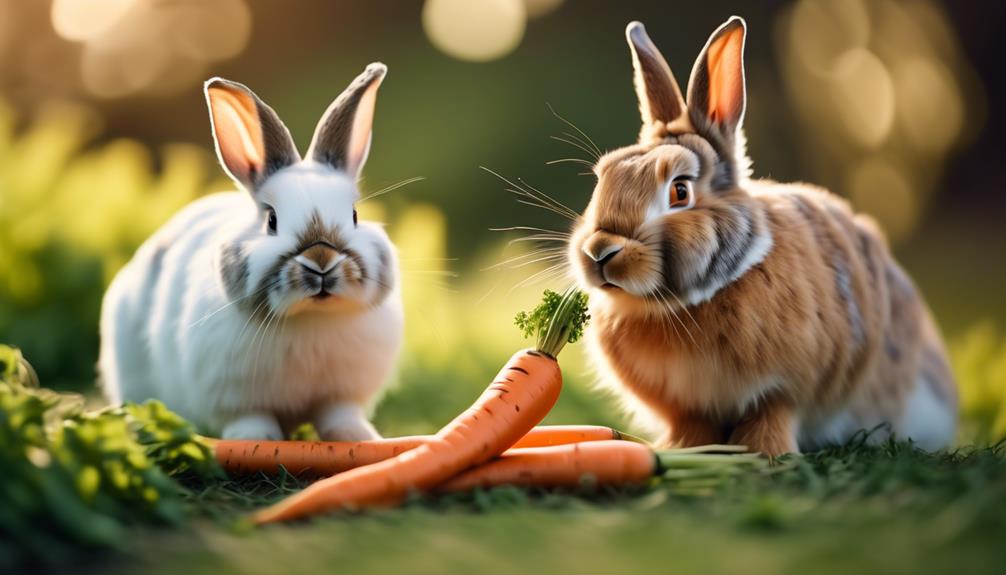
Maintaining a healthy weight is crucial for the well-being of your Sussex rabbit. Here are four important points to consider for Sussex rabbit weight management:
- Balanced Diet: Provide a nutritionally balanced diet consisting of fresh vegetables, limited fruits, high-quality rabbit pellets, and unlimited access to hay. Avoid overfeeding and limit treats to prevent excessive weight gain.
- Portion Control: Measure the amount of food you give to your Sussex rabbit to ensure they’re receiving the right portion size. Adjust the quantity based on their activity level and weight management goals.
- Regular Exercise: Encourage daily exercise by providing plenty of space for your rabbit to hop, run, and explore. A sedentary lifestyle can lead to weight gain, so engage in interactive playtime and provide toys and tunnels to keep them active.
- Veterinary Monitoring: Regularly monitor your Sussex rabbit’s weight and consult with a veterinarian if you notice any significant changes. They can provide guidance on weight management strategies and help address any underlying health concerns.
Sussex Rabbit Training
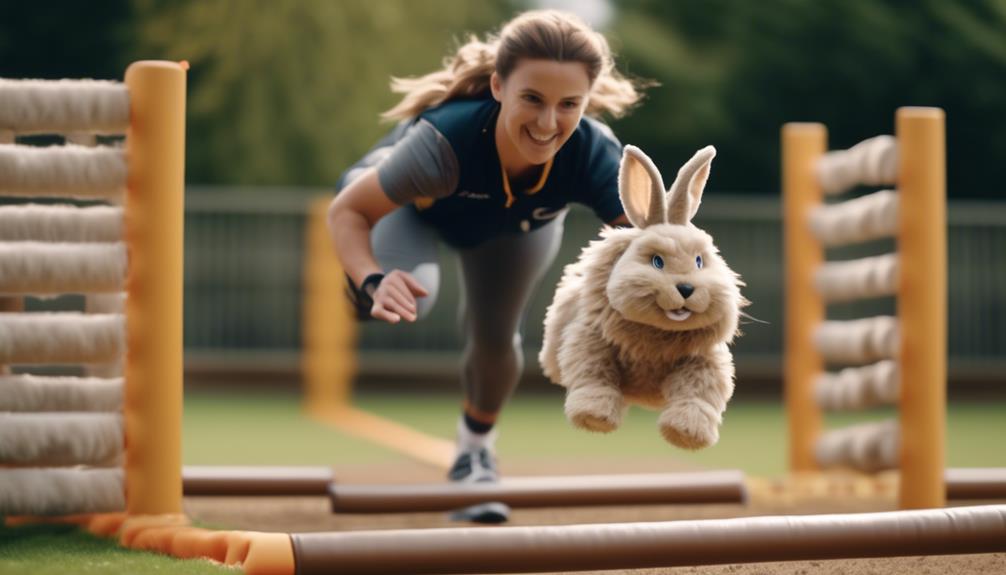
As you continue to care for your Sussex rabbit, it’s important to address their training needs to ensure a well-behaved and responsive companion. Sussex rabbits are known for their easy trainability and can be taught various behaviors, including litter box training. Here are some essential training tips to follow:
| Training Tips | Description |
|---|---|
| Consistency | Be consistent in your training methods and commands to avoid confusion. |
| Positive Reinforcement | Use treats and praise to reward desired behaviors, such as using the litter box or coming when called. |
| Socialization | Introduce your Sussex rabbit to different people, animals, and environments to help them become well-adjusted and friendly. |
| Clicker Training | Consider using a clicker to mark desired behaviors and reinforce positive associations. |
| Patience | Training takes time and patience. Be patient with your rabbit and don’t rush the process. |
Frequently Asked Questions
How Much Exercise Do Sussex Rabbits Need on a Daily Basis?
Sussex rabbits need regular exercise on a daily basis to stay healthy and prevent weight gain. Provide them with a safe and spacious area to hop and play, ensuring they get at least a few hours of activity each day.
Are Sussex Rabbits Suitable for Apartment Living?
Yes, Sussex rabbits are suitable for apartment living. They can live indoors as long as you provide them with a safe environment and a weatherproof enclosure. They are compatible with other pets too.
Can Sussex Rabbits Be Left Alone for Long Periods of Time?
Yes, Sussex rabbits can be left alone for long periods of time, but they require companionship and mental stimulation. Consider having a second rabbit or provide toys and activities to keep them entertained.
Do Sussex Rabbits Have Any Specific Grooming Needs?
Sussex rabbits have specific grooming needs. Regular brushing is necessary to maintain their soft, dense coats. Pay attention to their ears and eyes, as they are prone to ailments. Keep them clean and consult a veterinarian if needed.
Are Sussex Rabbits Prone to Any Specific Allergies?
Sussex rabbits are not specifically prone to allergies. However, they may experience weight gain, dental problems, and eye ailments. Regular monitoring of their weight and dental care is important for their overall health.
What Makes the Personality of Rare Rabbit Breeds Unique?
Rare American Chinchilla rabbit breeds boast unique personalities that set them apart from other breeds. Known for their intelligence, playfulness, and social nature, these rabbits make wonderful pets. Their calm and gentle demeanor make them a favorite among rabbit enthusiasts, adding to their allure as a rare and special breed.
Conclusion
In conclusion, the rare Sussex Rabbit breed is truly a delight for pet lovers. With their adorable teddy bear-like appearance and friendly temperament, they make wonderful companions.
Taking care of a Sussex Rabbit involves providing proper nutrition, regular veterinary care, and maintaining a healthy weight.
Their unique history and popularity among rabbit enthusiasts only add to their charm.
If you’re looking for a lovable and unique pet, the Sussex Rabbit might be the perfect choice for you.

